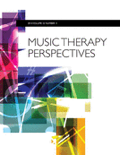
Music Therapy Perspectives
Scope & Guideline
Transforming Lives through the Art of Music Therapy.
Introduction
Aims and Scopes
- Clinical Applications of Music Therapy:
The journal focuses on how music therapy can be effectively applied in various clinical settings, including hospitals, mental health facilities, and hospice care, showcasing innovative practices and methodologies. - Research Methodologies in Music Therapy:
It emphasizes diverse research approaches, such as qualitative analyses, case studies, and systematic reviews, aimed at enhancing the evidence base for music therapy interventions. - Ethics and Professional Development:
The journal addresses ethical considerations in music therapy practice and research, alongside professional development topics for music therapists, ensuring that practitioners are well-informed about current standards and practices. - Cultural and Social Contexts of Music Therapy:
A significant focus on sociocultural identities and the role of music therapy in addressing issues of diversity, equity, and inclusion within therapeutic practices. - Educational Perspectives in Music Therapy:
It includes discussions on music therapy education, supervision, and the development of curricula that prepare future music therapists to meet the evolving demands of the profession.
Trending and Emerging
- Telehealth and Virtual Music Therapy:
The rise of telehealth has led to a significant increase in research on virtual music therapy practices, especially in response to the COVID-19 pandemic, showcasing adaptability in therapeutic delivery. - Integration of Technology in Music Therapy:
There is a growing interest in how technology can enhance music therapy practices, including the use of apps, online platforms, and digital tools to facilitate music interventions. - Focus on Mental Health and Well-being:
Recent publications emphasize the role of music therapy in addressing mental health challenges, aligning with broader societal concerns about mental well-being and resilience. - Community and Social Justice Themes:
Emerging studies are increasingly highlighting music therapy's role in community settings and its potential for social justice, particularly for marginalized groups and communities. - Interdisciplinary Collaboration:
The journal is seeing a rise in studies that explore collaborative practices between music therapists and other healthcare professionals, reflecting a trend towards integrated care models.
Declining or Waning
- Traditional Music Therapy Approaches:
There seems to be a decline in publications focused on traditional or established music therapy methods, as newer, more integrative approaches gain traction in the field. - Focus on Single Populations:
The journal has shown a reduced emphasis on case studies or research focused solely on specific populations (e.g., only children or only elderly), shifting towards more integrative studies that encompass broader demographic considerations. - One-Dimensional Assessments:
There is a waning interest in simplistic or one-dimensional assessments of music therapy outcomes, with a growing preference for multifaceted evaluations that consider various psychosocial factors.
Similar Journals
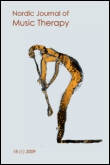
Nordic Journal of Music Therapy
Elevating Mental Health Through Musical InnovationNordic Journal of Music Therapy, published by the GRIEG ACADEMY, is a leading international journal dedicated to advancing the field of music therapy through high-quality research and scholarly discourse. With an ISSN of 0809-8131 and an E-ISSN of 1944-8260, this journal spans a rich history from 2001 to 2024, highlighting its commitment to the evolving landscape of music therapy practices. The journal has achieved impressive rankings across various categories, securing a Q1 status in Anthropology and Arts and Humanities while also maintaining strong positions in Complementary and Alternative Medicine and Psychiatry. This reflects its broad interdisciplinary impact, with Scopus rankings placing it in the 88th percentile for Anthropology and 80th percentile for Arts and Humanities, among others. The Nordic Journal of Music Therapy serves as a vital resource for researchers, clinicians, and students keen on exploring innovative therapeutic approaches and enhancing their understanding of the intersection between music and mental health.

Information and Communication Technology in Musical Field
Pioneering New Frontiers in Music and Communication TechnologyInformation and Communication Technology in Musical Field is an esteemed academic journal published by MEDIA MUSICA, dedicated to exploring the intersections of technology and music. With an ISSN of 2067-9408 and an E-ISSN of 2069-654X, this journal serves as a vital resource for researchers, professionals, and students interested in the latest advancements and applications of information and communication technologies within the musical sphere. While specific impact factor metrics are currently unavailable, the journal aims to provide a platform for high-quality research that fosters innovation in music production, distribution, and theory. The implications of technology in music are profound, influencing everything from composition to performance and consumption, and this journal strives to illuminate these transformative changes. Located in Cluj-Napoca, Romania, at STR ICBRATIANU NR 25, this publication encourages submissions that contribute to the diverse dialogue surrounding music and technology, ensuring that it remains an essential reference for those at the forefront of this dynamic field.

Problemy Muzykalnoi Nauki-Music Scholarship
Pioneering Research in the Realm of Music ScholarshipWelcome to Problemy Muzykalnoi Nauki-Music Scholarship, a leading journal in the field of music scholarship published by the esteemed Gnesin Russian Academy of Music. With an ISSN of 2782-358X and an E-ISSN of 2782-3598, this Open Access journal has been committed to the dissemination of high-quality research since 2009, making scholarly work accessible to a global audience. Covering diverse aspects of music theory, history, and its socio-cultural impacts, Problemy Muzykalnoi Nauki serves as an essential platform for scholars, educators, and practitioners in the arts and humanities, as well as in social sciences related to music education. While its Scopus coverage was discontinued in 2021, the journal remains influential, holding a rank of #48 in the Arts and Humanities category and a percentile of 67th, showcasing its relevance and rigor in the discipline. We invite researchers and students alike to explore the rich contributions made within these pages, fostering a deeper understanding and appreciation of music in contemporary society.
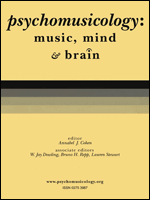
Psychomusicology
Transforming Understanding Through the Science of SoundPsychomusicology is a premier journal dedicated to the interdisciplinary exploration of the intersection between psychology and music. Published by the American Psychological Association, this esteemed publication serves as a vital resource for researchers, professionals, and students keen on understanding the profound impact of music on human cognition, emotion, and behavior. With a commitment to publishing high-quality research, Psychomusicology offers insights into diverse topics ranging from music perception and performance to the therapeutic applications of music. By fostering a community of scholars interested in the psychological aspects of music, the journal aims to advance empirical research and stimulate innovative thinking in the field. The ISSN for print is 0275-3987, while the electronic version can be accessed under E-ISSN 2162-1535. Unfortunately, the journal currently does not offer Open Access options, but it remains an essential reference for those engaged in the psychological and musical disciplines, promoting an enriched understanding of how music shapes the human experience.
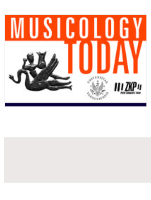
Musicology Today
Pioneering Insights in Contemporary Music StudiesMusicology Today, published by SCIENDO, is a pivotal journal in the field of musicology, presenting a platform for scholars, researchers, and practitioners to disseminate their findings and engage with current trends in music research. With its ISSN 1734-1663 and E-ISSN 2353-5733, the journal aims to provide a comprehensive overview of various aspects of music, including theory, history, and ethnomusicology, fostering a multidisciplinary dialogue among its contributors. Located in Warsaw, Mazovia, Poland, this journal is not only committed to high academic standards but also to promoting open access to knowledge, thereby enhancing accessibility for a global audience. As it continues to bolster its reputation in the academic community, Musicology Today plays an essential role in shaping the future of music scholarship and invites the engagement of seasoned researchers and emerging voices alike.
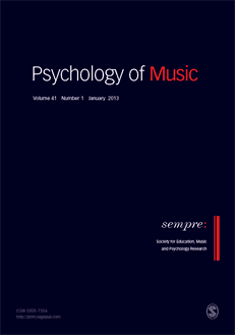
Psychology of Music
Decoding the Rhythm of Human PsychologyPsychology of Music is a prominent academic journal published by SAGE Publications Inc, focusing on the interdisciplinary field that bridges psychological principles and musical expression. Established in 1973, this esteemed journal plays a crucial role in advancing understanding of how music affects emotions, cognition, and social interactions, thus catering to a diverse audience of researchers, educators, and practitioners in both psychology and music. With an impressive impact factor that places it in the Q1 category for Music and Q2 for Psychology (miscellaneous) in 2023, this journal ranks 3rd out of 180 in Arts and Humanities – Music, and 19th out of 97 in Psychology (miscellaneous) according to Scopus metrics, affirming its authoritative contribution to the field. The Psychology of Music is essential for those looking to explore cutting-edge research, methodologies, and applications, providing rich insights and fostering discussions that reach into music therapy, education, and psychological wellness. Although it is not an open-access journal, its high-quality peer-reviewed articles are pivotal for anyone dedicated to the intricate relationship between music and the mind, making it a must-read for professionals and students alike.

SPRACHE-STIMME-GEHOR
Exploring Innovations at the Intersection of Psychology and Communication.SPRACHE-STIMME-GEHOR is an esteemed academic journal published by GEORG THIEME VERLAG KG since 1980, focusing on the intersection of applied psychology, psychiatry, and speech and hearing. With an ISSN of 0342-0477 and E-ISSN 1439-1260, this journal serves as a vital resource for researchers, clinicians, and students dedicated to advancing knowledge and practice in these fields. Although currently not an open access journal, its rigorous peer-review process ensures the publication of high-quality research and clinical studies. In the 2023 Scopus ranking, it holds a position in the fourth quartile in relevant categories such as Applied Psychology and Speech and Hearing, illustrating its niche yet important role within the scientific community. The journal, based in Stuttgart, Germany, offers insights into innovative therapeutic approaches, evidence-based practice, and the latest trends, making it an essential read for professionals striving to enhance their understanding and impact in speech and hearing disciplines.

OR SPECTRUM
Innovating Strategies in Business and Management ResearchOR SPECTRUM, published by SPRINGER, is a premier journal in the fields of Business, Management, and Operations Research, with a distinguished reputation established since its inception in 1979. As of 2023, it holds an impressive Q1 ranking in Business, Management and Accounting (miscellaneous) and a Q2 ranking in Management Science and Operations Research. The journal, which is indexed under ISSN 0171-6468 and E-ISSN 1436-6304, boasts a significant impact factor within its scope, making it a pivotal resource for cutting-edge research and theoretical developments. With access options that favor traditional subscriptions, OR SPECTRUM offers a robust platform for the dissemination of innovative ideas and methodologies, vital for academics, professionals, and students alike. The journal's commitment to excellence ensures its critical role in enhancing the understanding and application of operational research techniques around the globe.

MUSIKTHEORIE
Exploring the Depths of Music TheoryMUSIKTHEORIE is a pivotal journal dedicated to the field of music theory, published by LAABER-VERLAG. With its ISSN 0177-4182, this journal serves as an essential platform for scholars, educators, and practitioners interested in the multifaceted dimensions of music theory. Although it does not currently offer open access, it provides in-depth analyses and critical discourse on theoretical frameworks, compositional techniques, and historical perspectives in music. Despite its coverage in Scopus being discontinued after 2018 and ranking within the 5th percentile of Arts and Humanities - Music, MUSIKTHEORIE remains a respected publication for advancing knowledge and fostering collaboration within the musicological community. Researchers and students alike can benefit from its rich content and the insights shared within its pages.
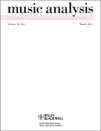
MUSIC ANALYSIS
Unlocking the Secrets of Musical InfluenceMUSIC ANALYSIS, published by WILEY, is a prestigious journal in the field of musicology, recognized for its critical contributions to the analysis of music and its myriad influences on culture and society. With an ISSN of 0262-5245 and an E-ISSN of 1468-2249, this journal has established itself as a vital resource for researchers, professionals, and students alike, boasting a Q1 ranking in the 2023 category of Music. As part of a highly competitive field, it ranks 70th out of 180 in the Arts and Humanities Music category on Scopus, positioning it within the 61st percentile. MUSIC ANALYSIS serves as an essential platform for innovative research and insightful discourse, engaging with musical theory, practice, and education from 1996 to 2024. Its commitment to fostering rigorous scholarship makes it indispensable for those seeking to deepen their understanding of music and its analytical frameworks. Although it does not offer Open Access options, its relevance and impact in the genre ensure accessibility through institutional subscriptions and university libraries.